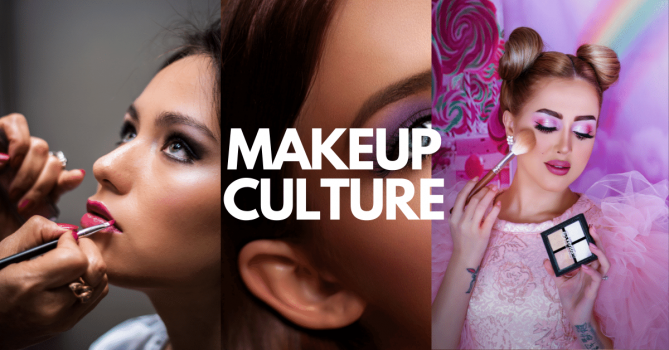Definition
Makeup culture is a set of beliefs and ideals that individuals, primarily women, hold to present themselves in a way that conforms to socially acceptable standards of femininity. Women are encouraged to wear cosmetics as part of their gender identification performance, as most societies equate it with mandatory social norms.
Makeup is “cosmetics applied to the face, such as lipstick or powder, intended to enhance or change the look.” Cosmetic body art is the oldest kind of ritual practiced by humans.
Explanation
Cosmetics are linked to concepts of competence and confidence, according to a study on makeup at work by sociologists Kirsten Dellinger and Christine L. Williams. This implies that women must first have access to these things in order to have the resources to buy them. This kind of class-based beauty prejudice has its roots in the capacity to pay for nutritious food, gym memberships, and attire that may be necessary for a specific work environment.
Regardless of their educational background or skill set, women may not even be given a chance to apply for jobs if specific beauty requirements are not matched. Consequently, one’s perceived ability to accomplish a job-related activity is primarily determined by their “appearance.” As it relates to who can afford certain items of clothes and cosmetics and who will be able to buy these cultural standards later in life owing to steady work, this also relates to how gender-based prejudice becomes a class problem.
Women in all living arrangements are responsible for upholding the situational standards of self-presentation, regardless of status or the means required to attain “beautiful.” The notion of beauty is not universal, as Julie Bettie has shown, but overall expectations for women are still significantly higher than those for males.
This unfair beauty standard fosters the idea that people vary in their physical appearance even when they are very young, omitting the underlying social context in which these views are formed. Particularly prevalent in the workplace, the different standards of “looking nice” for men and women cannot be explained from a biological standpoint.
Cosmetics culture refers to society’s expectations of feminine attractiveness, particularly the idea that women should always wear makeup.
There is no denying that teenagers are impressionable, and when females are forced to wear cosmetics constantly, it negatively affects how they see themselves.
The fact that other women are among the most prominent critics of women in the cosmetics culture is a significant problem. When women are not wearing cosmetics, females are tearing one other down and calling each other sloppy, a trend that may have originated from men who could not bear to see an “ugly” woman.
Instead, they may be understood as social constructs that impose uneven restrictions on women and much more restrictions on the work of women from lower socioeconomic strata. These constructs serve as social bases for transmitting perceived inequalities between men and women.
In certain situations, males may take advantage of their patriarchal dividend and forego the need for additional beautification expenses. While males may use more resources to achieve a specific “look,” women often have to give up more of their resources, which limits the amount of extra time, money, and power that can be utilized to cast doubt on their skills and abilities.
Cosmetic industry
The mainstream media constantly pressures young girls and women to appear a particular way and meet specific criteria. Cosmetic businesses that target young women claim that if they use their products, they would look better and get acceptance. In the end, this business capitalizes on the vulnerabilities of women in order to increase its profit margin.
Nowadays, celebrities play a significant part in the makeup culture business as founders or brand advocates.
Two approaches to the notion of beauty in makeup culture
Women in the first group favored a natural appearance. They proudly embrace what others regard as “flaws” while advocating the body-positive idea that “we should be authentic to ourselves.” We respect these women’s independence and self-assurance.
Then some individuals express themselves and utilize cosmetics as an artistic tool. The bold ones are them. Those who delight in dressing up as various personalities and who like altering their appearance each day.
Positive and Negative impacts of makeup culture
Makeup culture has a beneficial effect since it empowers individuals and increases their self-confidence. When they look nice, they feel fantastic. Additionally, cosmetics are much more widely available nowadays due to the easy accessibility of high-end and drugstore products.
The downside of today’s excessive makeup culture is that it makes individuals feel uneasy about their looks and forces them to cope with social pressures and image difficulties from a young age, particularly young girls.

